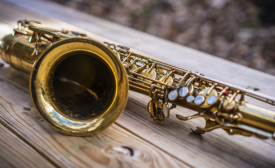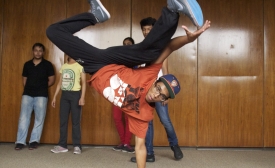jazz ambassadors

How U.S. jazz ambassadors harnessed the power of music to connect with the citizens of the Georgian Soviet Socialist Republic.
As part of the Jazz Diplomacy Project, Natixis has provided support to the Foundation for the National Archives and the Newport Festivals Foundation. “Our hope is to encourage more people to become ‘Jazz Ambassadors’ by sharing the history of jazz and exploring the lessons the world has learned through the genre,” added Hailer. “BeanTown’s ‘Global Ambassador’ theme and ideals of using music as a tool for peace, intercultural dialogue, social change, and democracy tie in nicely to our year-long Jazz Diplomacy effort.”
The Next Level program, sponsored by the U.S. Department of State’s Bureau of Educational and Cultural Affairs, in association with the University of North Carolina's Department of Music, uses hip-hop as a tool to foster cross-cultural creative expression and exchange in diverse communities around the world.

In Patna, Bihar, students learn how to express themselves and the world around them through dance.
In April 2013, I had the opportunity to accompany the Hawaiian slack key guitar ensemble Keola Beamer and Jeff Peterson, with Moanalani Beamer, as tour manager as the group toured Brazil with the U.S. Department of State's American Music Abroad program.
Since the 1950s, when Louis Armstrong, Dizzy Gillespie and Dave Brubeck embarked on State Department-sponsored tours around the globe, jazz has been a quasi-official part of U.S. diplomatic efforts. Jazz musicians were sometimes welcome in parts of the world where other Americans were not, and Armstrong was commemorated in a musical play as “the real ambassador."
These musicians are a part of the 10 jazz, hip hop and American roots ensembles that have been chosen by The Rhythm Road to travel as cultural ambassadors for the 2011 season. Selected ensembles tour internationally with The Rhythm Road to foster cross-cultural understanding through their music.







